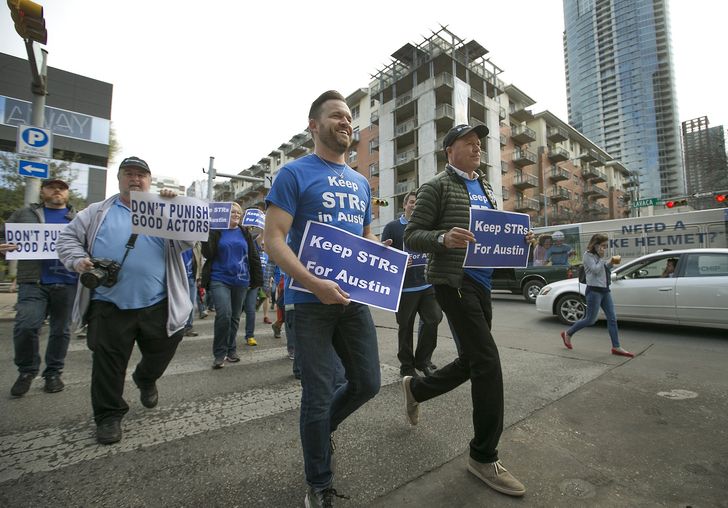By Matthew Kiessling, Short Term Rental Advocacy Center (STRAC) — With the first few months of 2016 behind us, presidential primary battles are headed into the home stretch, and state and federal election season is about to kick into high gear. But despite the prevailing wisdom that meaningful legislation falls by the wayside in such a politically charged environment, there is a reason for optimism throughout the short-term rental industry. At the time of this writing, no fewer than half a dozen state legislatures are in the process of considering bills that would implement statewide standards for short-term rentals. At present, Florida is the only state with such a law on the books.
Although there are various permutations of these bills, the spirit of each is the same: they seek to create a statewide structure that protects individuals’ property rights by prohibiting local municipalities from pursuing an outright ban of short-term rentals in their community. At the same time, these bills would provide local government the freedom to create any provisions or stipulations such as licensing, registration, enforcement, etc. that they deem necessary to ensuring the safety and well-being of travelers, providers, residents and the community as a whole. In short, they provide a state framework and leave the details up to local government.
But why the need for states to delve into a matter that has historically been ceded to localities as purely a zoning issue?
To answer that question, we need to look no further than Austin, Texas. A city that just a few short years ago gave us the gold standard of local short-term rental ordinances.

If you’re not familiar with this particular story, you’ve almost certainly encountered a similar one. Owners, managers and hosts take great care to ensure their properties are rented to responsible travelers who will act accordingly and abide by the guidelines set forth by short-term rental providers. By all accounts, the city’s short-term rental regulations were a success. However, among thousands of positive short-term rental interactions, a few misguided homeowners entered into the market and have resulted in the ensuing “baby out with the bathwater” scenario. Despite overwhelming evidence to the contrary, a few isolated incidents or a “problem property” suddenly became the poster child for short-term rentals. And with that narrative and a few very vocal opponents, no amount of public education, data or anecdotal evidence could successfully stem the tide. The solution offered by the largely newly elected city council was to ban short-term rentals in Austin. Despite the presence of dozens, and sometimes hundreds, of upstanding and responsible providers and hosts, the small vocal minority has spent countless time and energy painting short-term rentals as the scourge of the local community, making them the scapegoat for everything from safety concerns to affordable housing issues. And with that, the ban passed.
The community has been…saved???
In reality, we know quite the opposite to be true. Communities that embrace short-term rentals are simply recognizing the new economy and embracing the future, providing a regulatory environment for accommodations options that travelers are demanding with ever-increasing frequency. And when travelers utilize short-term rentals, studies show they stay longer and spend more money, not to mention the additional influx of much needed tax revenue for both the municipality and the state.
On the other end of spectrum are communities that effectively “ban” short-term rentals through ordinances or local laws that have little hope of being enforced, even less chance of reducing the occurrence of short-term renting and ultimately deprive the community of the corresponding local tax revenue by driving the activity underground.
Solution
Statewide standards provide a solution solving a variety of problems when implemented correctly. Unlike the various local laws and ordinances that many municipalities have created, a simple statewide standard codifies the practice of short-term renting and ensures both positive economic impact to the community and additional tax revenue generated by these accommodations.
But the path ahead is not an easy one.
Delegate Chris Peace of Virginia knows that all too well, writing of his attempt to get a statewide standard adopted this session in the Richmond Times-Dispatch after its defeat:
“Due to the leverage exerted by localities and the hotel industry, Virginia missed a real opportunity to be a leader in the sharing economy and to provide localities with much-needed revenue. That is disappointing. But you simply cannot stop economic innovation and creativity; it will always move forward.”
To be sure, the industry will encounter opposition to statewide standards from a variety of opponents. But done correctly, such legislation has the ability to unify state policymakers, while not usurping municipalities’ ability to govern short-term rentals locally.
At their core, statewide standards offer the opportunity to protect the rights of an individual to utilize a home or property as a short-term rental while simultaneously encouraging the positive economic impact of travel and tourism. They also create a stable new tax base while allowing cities and municipalities to ascribe the necessary local requirements to balance the needs of travelers and providers with those of long-term residents and the community as a whole.
This is a common sense solution to an issue that will continue to be fought and go unresolved at the local level. The time has come for state governments to lend a hand to municipalities on this issue, create a framework and allow everyone to embrace the future.


